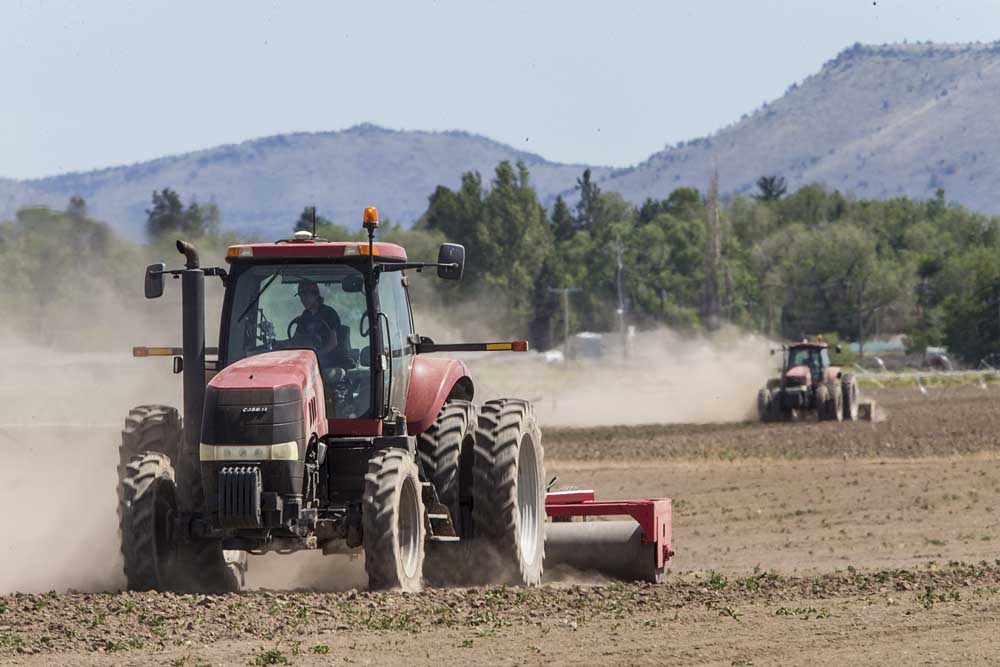Legislature OKs $40M forgivable disaster loans for Oregon farmers
Published 9:45 am Tuesday, December 14, 2021

- Dust fills the air as Trevor Smith, front, and his mother prepare a field to plant a crop in June near the town of Metolius in Jefferson County.
Oregon farmers who’ve suffered from drought and other disasters will gain access to $40 million in forgivable loans under a legislative package approved Monday.
The money will serve as a “bridge” to keep farmers afloat while they wait for U.S. Department of Agriculture assistance, but the loans will be forgiven if growers don’t qualify for federal disaster relief.
“We’re telling farmers and ag workers across the state that we acknowledge how hard it’s been to survive this year,” said Rep. Bobby Levy, R-Echo, before the House floor vote.
Throughout 2021, farmers have been plagued by winter storms, drought, heat waves, insect infestations, wildfires and flood damage, all during a global pandemic.
“It’s been the hardest year for natural disasters in many Oregon producers’ memories,” said Mary Anne Cooper, Oregon Farm Bureau’s vice president of public policy, during a legislative hearing on the bill.
The forgivable loans are intended to allow farmers to stay in business, but won’t actually result in a profitable year, she said. “I just think that’s out of reach for the 2021 year.”
The Oregon Farm Bureau estimates about $75 million was made available to disaster-afflicted growers in the legislative package, which was passed during Monday’s special session.
The idea for forgivable loans sprang from concerns that niche Oregon farmers face “gaps” in USDA disaster programs, which are primarily designed for major commodity crops.
For example, damage from the ice storm and heat wave this year may not directly kill hazelnut trees or nursery stock. However, yields and marketability are adversely affected.
“Assistance is needed to help producers with losses not covered by federal programs,” said Megan Kemple, director of policy advocacy for the Oregon Climate and Agriculture Network nonprofit.
Farmers with adjusted gross incomes of less than $500,000 will qualify for loans of up to $125,000 under the bill.
The loan money cannot increase their total income beyond 90% of the three-year average of what they earned in 2017, 2018 and 2019. Due to volatility associated with the coronavirus outbreak, 2020 was excluded from the calculation.
Rep. Jami Cate, R-Lebanon, objected to the limits of $500,000 on adjusted gross income and $125,000 in loan amounts, arguing that larger farms are still family-owned “mom and pop businesses,” she said.
When their expenses are in the millions of dollars, farmers must also have revenues in the millions, Cate said before the House floor vote. “Having bigger farms or higher-value crops just means you’re playing with higher stakes.”
The rules will be different for “historically disadvantaged” farmers identified by the Oregon Department of Agriculture, which will oversee the program.
Historically disadvantaged farmers will qualify for loans of up to $150,000 if they had an adjusted gross income less than $350,000 in 2021. The loans can’t raise their total income beyond 95% of their three-year average revenue.
The loans will be disbursed by banks that are under contract with the state agriculture department, which will rely on their experience lending to the farm industry.
“This is a new program unlike anything we’ve done before,” said Jonathan Sandau, special assistant to the department director. “This will not be live next week, and it will take time to get right.”
Farmers who ultimately receive financial help from USDA must repay enough of the loans to bring them below 90-95% of their average annual income.
“Recipients will not be made whole or profitable under this program,” Sandau said during a hearing.
The overall $400 million legislative package focused on housing rental assistance, drought relief measures and Afghan refugee resettlement, among other issues.
The forgivable disaster loan program was the largest component of the $100 million allocated for drought relief.
Lawmakers dedicated more than $11.6 million to Oregon Watershed Enhancement Board grants aimed at drought resilience and irrigation modernization.
They also allocated $6 million to several drought-afflicted irrigation districts, $5 million for grasshopper and cricket suppression and $8 million for Klamath Basin drought assistance, among other programs.
The agriculture industry also stands to benefit from the $25 million approved for stopping illegal marijuana grows. If successful, it would reduce water theft and other rural problems.
Law enforcement agencies will receive $20 million in grants to fight unlawful production of marijuana, while $5 million with go to expand water rights enforcement.
“After simmering for a number of years, this crisis exploded across the Rogue Valley in 2021,” said Sen. Jeff Golden, D-Ashland, during a hearing on the proposal.
“Absent strong action, what’s happened in my district is a preview of coming attractions for much of rural Oregon,” he said.
Brandon Ross, an organic farmer near Ashland, said a marijuana grower held a gun to his head this year while he investigated why his irrigation source dried up.
“They made it clear they’d be using the water that year,” Ross said during the hearing. He planned to take a break from growing organic vegetables for at least a year due to the problem.
“I love farming but it’s not safe or viable in Oregon anymore,” he said.
There were more illegal marijuana grows than law enforcement officers in Jackson County could deal with this year, said Nate Sickler, the county’s sheriff.
The drug cartels who run these illegal operations have a business model that involves swamping law enforcement with grow sites, Sickler said. “They know know we’re going to get some but we can’t get it all.”
Increased enforcement aimed at stopping illegal marijuana production was supported by legal producers of the crop, who testified in favor of the bill.
Legal producers can’t compete against those who don’t spend money on taxes, workers’ compensation or insurance, they said.
If the state’s law enforcement agencies make unlawful grow sites unprofitable, the operators will hopefully pick up stakes and leave, said Sen. Tim Knopp, R-Bend. “What you tolerate, you will get more of. I suggest that we not tolerate it at all and that we eliminate it.”






